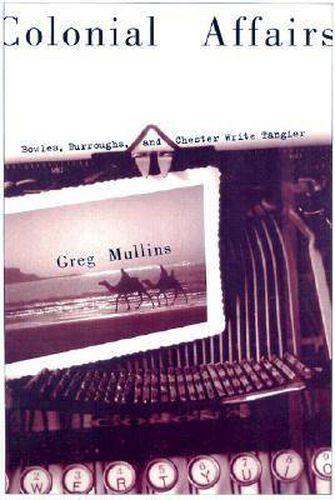Readings Newsletter
Become a Readings Member to make your shopping experience even easier.
Sign in or sign up for free!
You’re not far away from qualifying for FREE standard shipping within Australia
You’ve qualified for FREE standard shipping within Australia
The cart is loading…






A North African port city that was home to as many Europeans as Moroccans, postwar Tangier was truly an international zone, a place where the familiar boundaries of language, culture, nationality, and sexuality blurred, and anything seemed possible. In the 1950s and 1960s three leading American writers settled in Tangier, where they were able to find critical new ways of living and writing on the margins of society. A subtle literary portrait of Paul Bowles, William S. Burroughs, and Alfred Chester,
Colonial Affairs
is also a complex and perceptive account of the ways colonialism and sexuality structure each other, particularly as reflected in the literature written in postwar Tangier. Sexual commerce and culture flourished in Tangier during these years, as gay expatriates fled repressive sexual norms at home. Greg Mullins explores the covert and overt representations of sex, fantasy, desire, and sexual identity in the literature of Bowles, Burroughs, Chester, and Moroccan authors who collaborated with Bowles. He argues that expatriate writing in Tangier articulates the desire to exceed national and other forms of identity through representations of sex, especially marginalized forms of sex and sexuality. The literature that emerges variously celebrates, critiques, and attempts to evade the double bind of colonial sexuality. Framed in relation to queer and postcolonial theory, Mullins’s work is grounded in contemporary debates about sex, race, and desire. His sophisticated yet nimble analysis establishes beyond any doubt the central importance of colonialism and sexuality in the fiction of these writers working at once at the center and the margins of tradition - and reveals to contemporary readers the queer angles of their distinctly original work.
$9.00 standard shipping within Australia
FREE standard shipping within Australia for orders over $100.00
Express & International shipping calculated at checkout
Stock availability can be subject to change without notice. We recommend calling the shop or contacting our online team to check availability of low stock items. Please see our Shopping Online page for more details.
A North African port city that was home to as many Europeans as Moroccans, postwar Tangier was truly an international zone, a place where the familiar boundaries of language, culture, nationality, and sexuality blurred, and anything seemed possible. In the 1950s and 1960s three leading American writers settled in Tangier, where they were able to find critical new ways of living and writing on the margins of society. A subtle literary portrait of Paul Bowles, William S. Burroughs, and Alfred Chester,
Colonial Affairs
is also a complex and perceptive account of the ways colonialism and sexuality structure each other, particularly as reflected in the literature written in postwar Tangier. Sexual commerce and culture flourished in Tangier during these years, as gay expatriates fled repressive sexual norms at home. Greg Mullins explores the covert and overt representations of sex, fantasy, desire, and sexual identity in the literature of Bowles, Burroughs, Chester, and Moroccan authors who collaborated with Bowles. He argues that expatriate writing in Tangier articulates the desire to exceed national and other forms of identity through representations of sex, especially marginalized forms of sex and sexuality. The literature that emerges variously celebrates, critiques, and attempts to evade the double bind of colonial sexuality. Framed in relation to queer and postcolonial theory, Mullins’s work is grounded in contemporary debates about sex, race, and desire. His sophisticated yet nimble analysis establishes beyond any doubt the central importance of colonialism and sexuality in the fiction of these writers working at once at the center and the margins of tradition - and reveals to contemporary readers the queer angles of their distinctly original work.